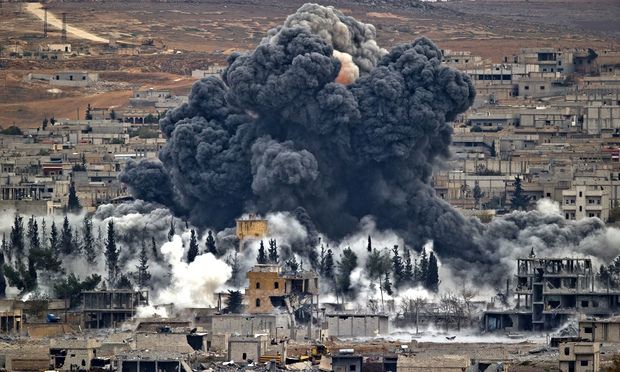2016 Bombings Across the Globe: How ISIS Has Grown in Scope
By Alexander Stringer
Staff Writer
Since claiming responsibility for the Paris attacks in November, ISIS has increased its violent acts in Europe and the Middle East. In fact, since November, there has been at least one bombing from affiliates of the terror cell each month, not to mention regular military exercises, according to the New York Times. Considering the sheer volume of these bombings, the details can get lost in the news cycle, here is the Envoy’s briefing on 2016 bombings with casualties above 20.
January 11 – Muqdadiyah and Baghdad, Iraq
On January 11, Daesh conducted bombings in two Iraqi cities. In Baghdad, ISIS members with suicide vests stormed a shopping mall, detonating among crowds of shoppers. Further militants moved in to take hostages, killing several. There was also a car bomb in a suburb on the other side of the city. The day brought about 18 deaths and 19 injuries, Reuters reports.
Muqdadiyah, a city on the fringes of ISIS territory, witnessed its own string of violence. Two car bombs in the city claimed 20 more lives, with no official injury count being released. These two events combined created the highest death toll in three months.
January 12 – Istanbul, Turkey
This was the first of several bombings in Istanbul this year. The bombing took place in the heart of a major tourist attraction in Istanbul, Sultanahmet Square, claiming the lives of some ten tourists, all of them German, according to CNN.. Following the incident, Turkish Prime Minister Ahmet Davutoglu vowed to stop attacks from the terror group in Turkey, only for the city to be rocked by more explosions a month later.
January 14 – Jakarta, Indonesia
In their first attack in Southeast Asia, ISIS executed two bombings and a number of firefights in the streets of Jakarta, in predominantly Muslim Indonesia. The Guardian reports that seven militants barricaded themselves inside a Starbucks, exchanging fire with police for three hours before detonating themselves.
An additional attack took place at a police station where ISIS members fired upon several police officers, killing two before being shot themselves. The whole ordeal left eight dead and some 24 injured, mostly from the Starbucks bombs.
January 26 – Homs, Syria
The city of Homs has witnessed incredible amounts of violence from the Islamic State, with the first of numerous bombings this year taking place on January 26. This day of violence, according to Reuters saw two separate bombings, the first a car bomb at an Assad-regime security checkpoint.
While crowds gathered around the site of the first bomb, a second attacker, supposedly in a military uniform, detonated a suicide belt among the onlookers. Estimates put the death toll at 29, with unknown numbers of injuries, though they are assumed to have surpassed a hundred.
January 27 – Ramadi, Iraq
The attacks of January 27 in Ramadi were specifically targeted at Iraqi military personnel in the city. Al Jazeera reports that there were a dozen car bombs detonated across the city over the duration of the day, claiming 55 soldiers and injuring an unknown amount of people, both military and civilian.
January 31 – Damascus, Syria
As ISIS moved closer to negotiations with United Nations peace groups, they also attacked a Shia section of Damascus. According to the Guardian, the attack, which took place at one of the holiest Shia shrines in the city, was targeted at religiously-aligned freedom fighters in the city. This attack claimed more than 60 lives and over a hundred were injured in the explosions.
Another attack on February 9 in Damascus, this time a car bomb, claimed an additional eight lives. The car was detonated in the parking lot of a police station, and injured 20 people.
February 21 – Homs and Damascus, Syria
These attacks came on the same day United States and Russian officials announced progress toward ending the Syrian civil war, part of a two-pronged offensive that day in Syria. Two explosions rocked Shia-majority sections of the city of Homs, one a car bomb, the other a suicide vest. Al Jazeera reports the number of deaths to be 42, with an additional 100 injured.
The second phase on this day took place in Damascus. This attack at the Sayyida Zeinab shrine, the burial place of Mohammed’s granddaughter, was executed as local schools were dismissing students, so as to inflict maximum damage on Shia youth. The bombs were detonated from a car in the parking lot around the shrine before militants with suicide vests rushed fleeing crowds. The total mortality number stands at 134, with an additional 180 injured.
February 28 – Muqdadiyah, Iraq
In the second attack on the Iraqi city this year, two bombs were detonated across the city. The first was a suicide vest detonated in a small crowd–details about this bombing are patchy at best.
The second bomb, however, was far more high-profile, taking place in the middle of a funeral for a prominent local Shia leader. In total, these attacks claimed the lives of 40 peoples, including two high-ranking military officers attending the funeral. An additional 58 were injured.
March 6 – Hillah, Iraq
An ISIS militant drove an explosive-laden truck into a military checkpoint in Hillah, Iraq. This marked the third bombing around Baghdad that week, with this attack being by far the largest, killing 61 and wounding 95 more. The bomb was so powerful it leveled all buildings at the checkpoint, and destroyed dozens of cars lined up to enter the city.
March 19 – Istanbul, Turkey
In the early morning there was a second bomb detonated by ISIS this year in Istanbul, Turkey. The attacker, wearing a suicide vest, supposedly detonated early on accident, resulting in fewer fatalities.
The attack was intended to occur closer to government buildings, but ended up exploding several blocks away in the middle of a street, claiming four lives and injuring 36.
March 22 – Brussels, Belgium
Just days after the arrest of Salah Abdeslam, a man wanted for planning the Paris attacks, ISIS retaliated in Belgium against the European community, detonating three coordinated nail bombs. Two of these bombs exploded within the Brussels Airport and one in a metro station.
There has been much media and public attention on this bombing, the second attack in a major European city and nation within six months without much provocation. At the time of writing, eight people have been arrested in connection to the plot that killed 32 and injured an additional 340.
March 25 – Aden, Yemen
In a triple car bombing at security checkpoints in the largest city in southern Yemen, ISIS struck yet more terror into the Middle East. Two bombs were in cars, hitting a Saudi Arabian base in Aden. The third was in an ambulance that used its sirens to get close to a security checkpoint before detonating. The attacks killed 26 and injured an unknown number.
March 26 – Baghdad, Iraq
In yet another bombing near Baghdad, ISIS made a public performance akin to the Paris attacks. A bomber wearing a suicide vest walked into a crowded stadium towards the end of a soccer match and detonated in the crowd of leaving fans.
CNN reports that the crowd had been celebrating a local team’s championship, and in an unverified video, the bomb can be seen detonating while the athletes received their trophies. The attack claimed the lives of 40 and injured another 65.
There were more bombings and terror attacks in any of the first three months of 2016 than in all of the 1980s and ‘90s combined. The number is staggering, and the media only brings attention to the most gruesome and alarming of these acts, ignoring countless others due to the frequency of incidents.



